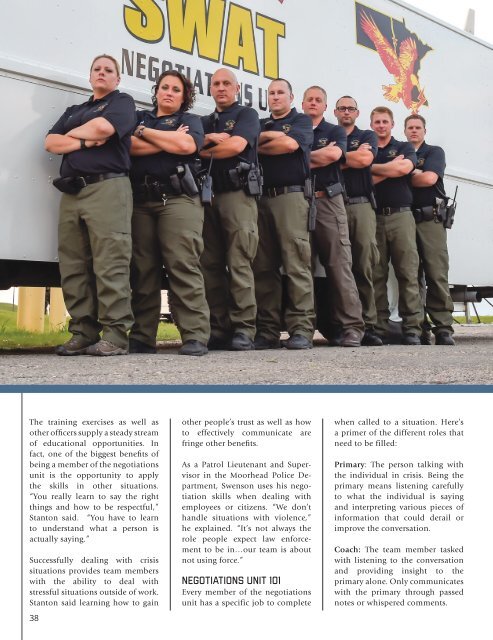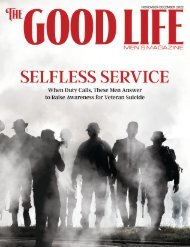The Good Life – November-December 2015
Featuring USHL hockey coach, Cary Eades. Local Heroes - SWAT Negotiations Unit, a day in the life of a flight instructor, and more in Fargo Moorhead's only men's magazine.
Featuring USHL hockey coach, Cary Eades. Local Heroes - SWAT Negotiations Unit, a day in the life of a flight instructor, and more in Fargo Moorhead's only men's magazine.
You also want an ePaper? Increase the reach of your titles
YUMPU automatically turns print PDFs into web optimized ePapers that Google loves.
<strong>The</strong> training exercises as well as<br />
other officers supply a steady stream<br />
of educational opportunities. In<br />
fact, one of the biggest benefits of<br />
being a member of the negotiations<br />
unit is the opportunity to apply<br />
the skills in other situations.<br />
“You really learn to say the right<br />
things and how to be respectful,”<br />
Stanton said. “You have to learn<br />
to understand what a person is<br />
actually saying.”<br />
Successfully dealing with crisis<br />
situations provides team members<br />
with the ability to deal with<br />
stressful situations outside of work.<br />
Stanton said learning how to gain<br />
38<br />
other people’s trust as well as how<br />
to effectively communicate are<br />
fringe other benefits.<br />
As a Patrol Lieutenant and Supervisor<br />
in the Moorhead Police Department,<br />
Swenson uses his negotiation<br />
skills when dealing with<br />
employees or citizens. “We don’t<br />
handle situations with violence,”<br />
he explained. “It’s not always the<br />
role people expect law enforcement<br />
to be in…our team is about<br />
not using force.”<br />
Negotiations Unit 101<br />
Every member of the negotiations<br />
unit has a specific job to complete<br />
when called to a situation. Here’s<br />
a primer of the different roles that<br />
need to be filled:<br />
Primary: <strong>The</strong> person talking with<br />
the individual in crisis. Being the<br />
primary means listening carefully<br />
to what the individual is saying<br />
and interpreting various pieces of<br />
information that could derail or<br />
improve the conversation.<br />
Coach: <strong>The</strong> team member tasked<br />
with listening to the conversation<br />
and providing insight to the<br />
primary alone. Only communicates<br />
with the primary through passed<br />
notes or whispered comments.


















